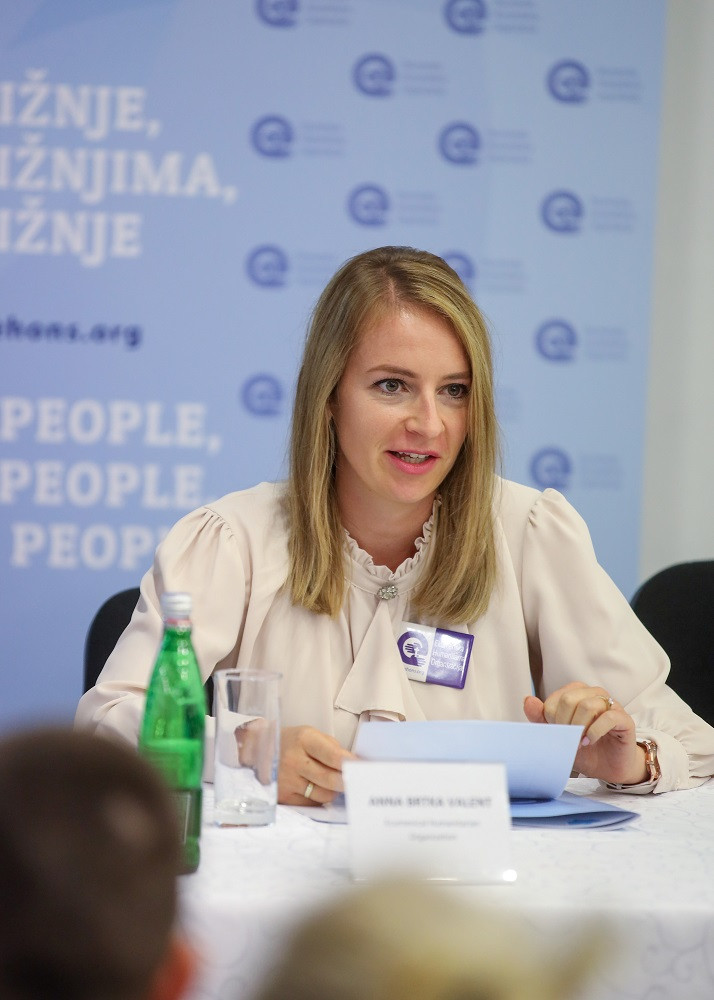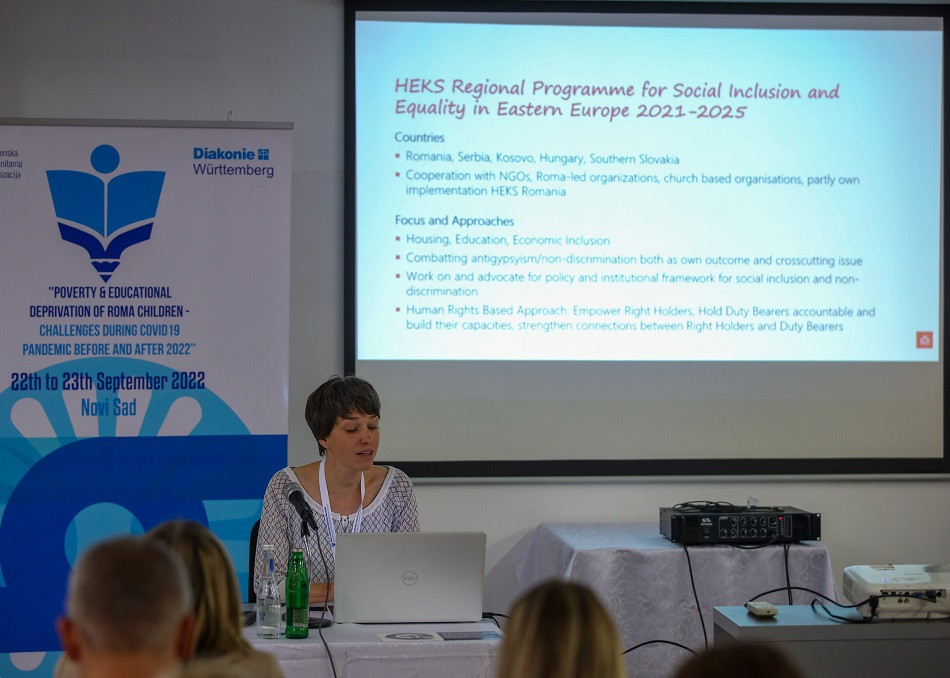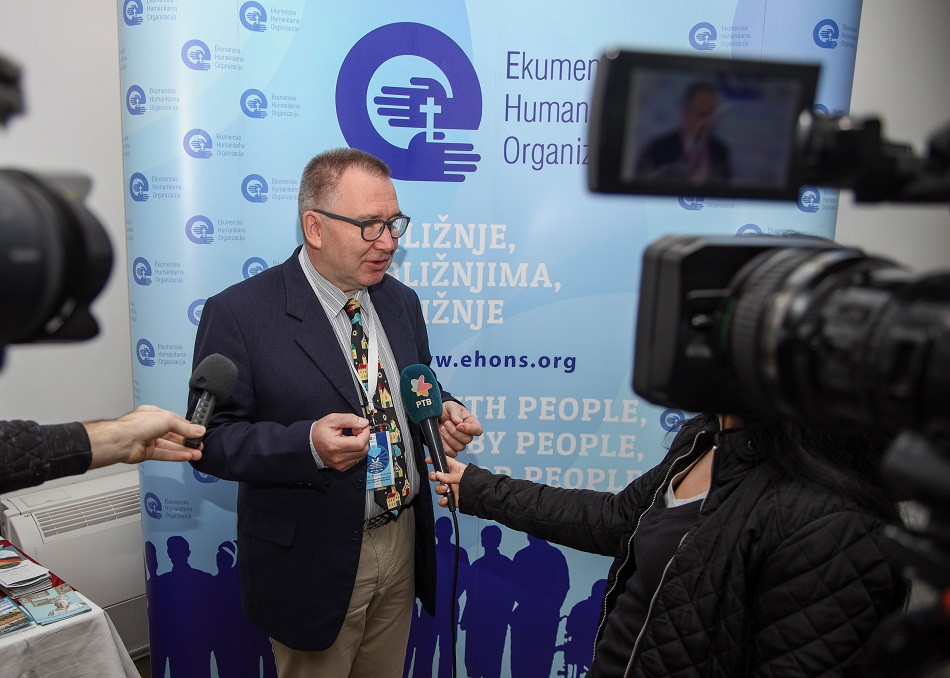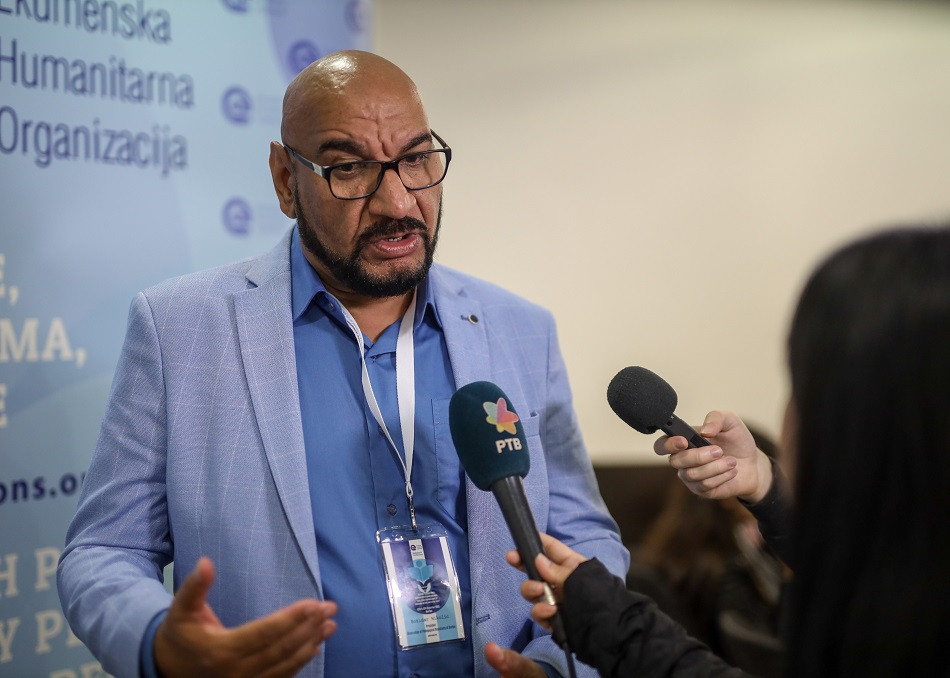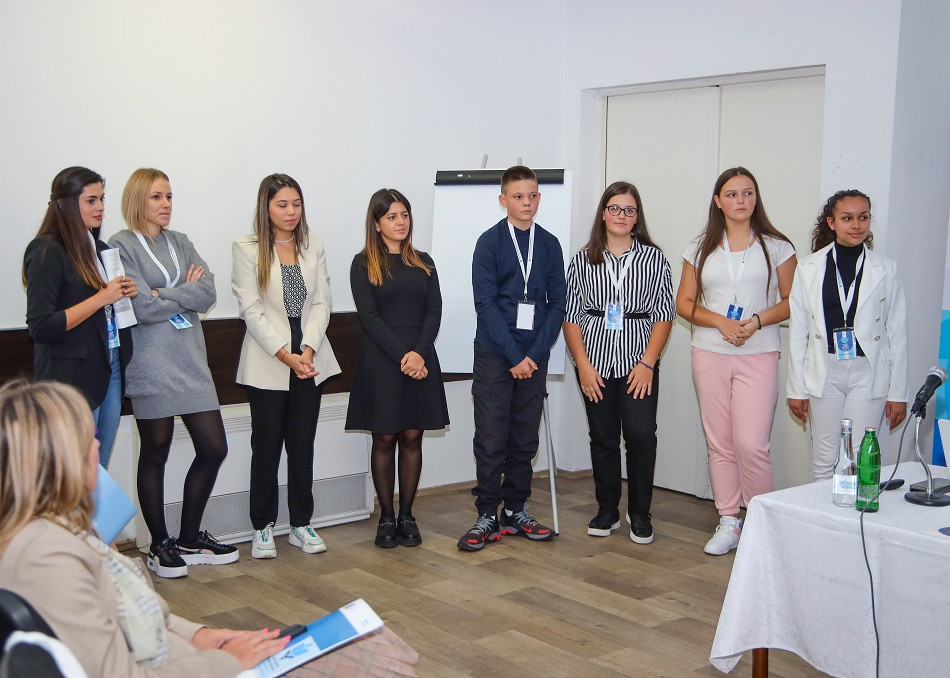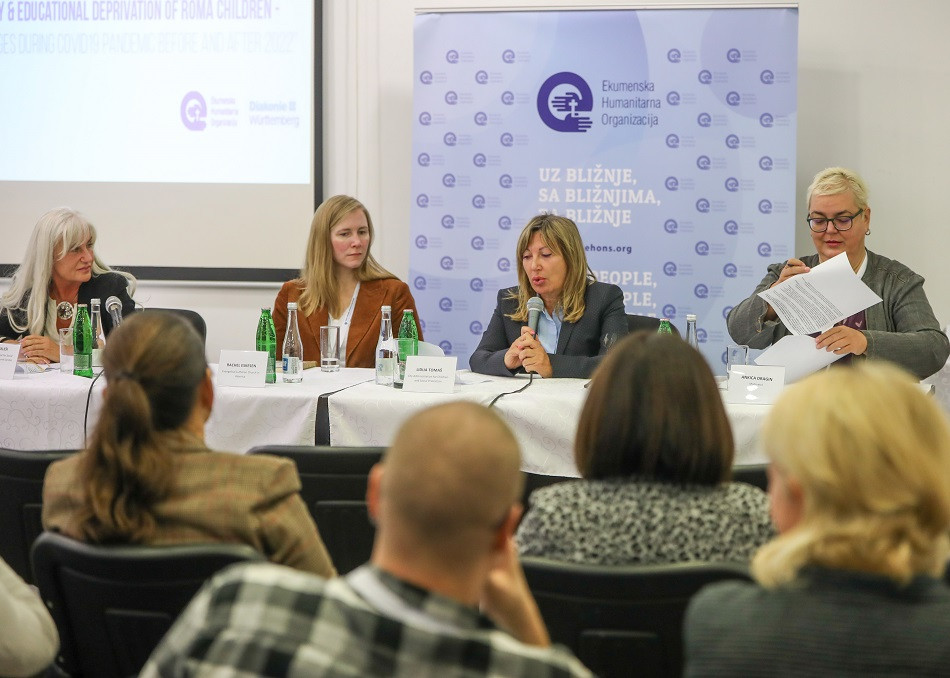International conference "Poverty and educational deprivation of Roma children - challenges during the COVID-19 pandemic before and after 2022."
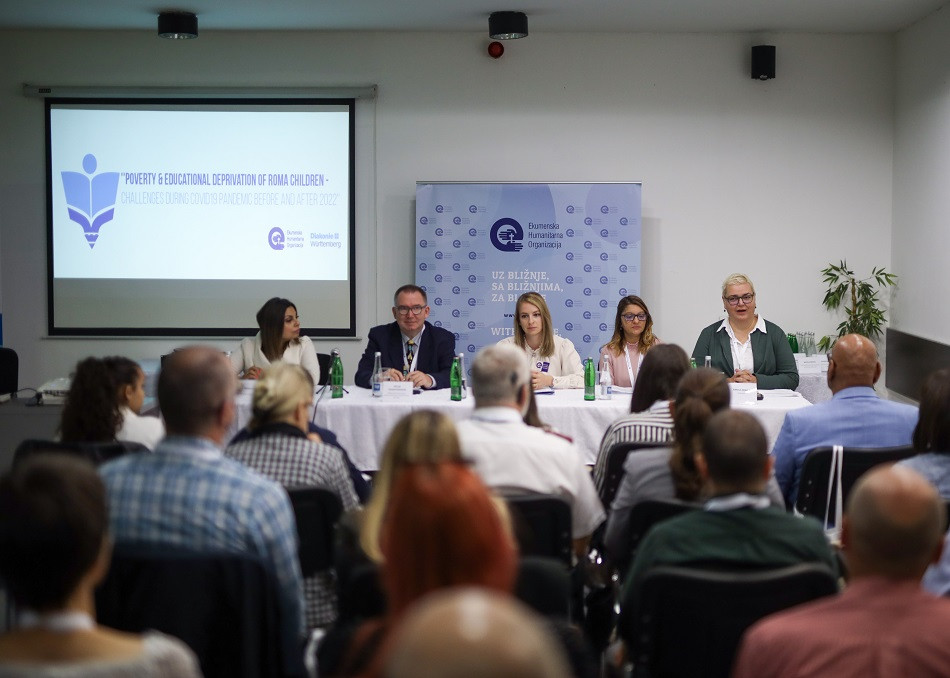
30. Sep 2022.

The international conference "Poverty and educational deprivation of Roma children - challenges during the COVID-19 pandemic before and after 2022" was held in the period 22 - 23 September 2022. in Hotel Putnik in Novi Sad, organized by the Diakonie Württemberg from Germany and the Ecumenical Humanitarian Organization from Novi Sad.
The aim of the conference was to bring together participants from different countries and to offer different practices and experiences within the two days of the conference in the field of improving the education, social and health care of Roma children, with special reference to the challenges during the period of the COVID19 pandemic .
Over 80 participants at the conference were from the following countries: Slovenia, Great Britain, Croatia, Hungary, Slovakia, Czech Republic, Switzerland, United States of America (USA), Germany, Bosnia and Herzegovina, Belgium and Serbia.
During the two days of the conference, four different panels were held, within which 17 domestic and foreign lecturers had the opportunity to present their presentations on the topic of children's rights, education, inclusion and services in the social protection system.
On the first day of the opening of the conference, the participants were greeted by:
-Pétur Thorsteinsson – Coordinator of the Hope for Eastern Europe action from the Diakonia of Württemberg, Federal Republic of Germany
-Ljiljana Mihajlović – Director of the Roma Inclusion Office of AP Vojvodina, Republic of Serbia
-Zdravka Simić – Member of the National Council of Roma, Republic of Serbia
-Anna Brtka Valent - Director of the Ecumenical Humanitarian Organization, Republic of Serbia.
In the first panel: "Educational deprivation of Roma children" , the following spoke:
-Angela Elmiger - Head of the Program for Eastern Europe and the Middle East - HEKS/EPER, Switzerland
-Slađana Jovanović - Project Coordinator - Ecumenical Humanitarian Organization, Republic of Serbia
-Božidar Nikolić - President Association of Pedagogical Assistants of the Republic of Serbia
-David Blowers - President of the European Network of Roma Missions, The Salvation Army, Great Britain .
During the second panel on the first day of the conference: "Children's rights in education, social protection system and healthcare system" , the following spoke:
-Damir Krkobabić - Project Coordinator, Ecumenical Humanitarian Organization, Republic of Serbia
-Branka Brkić - Advisor, Research Department of the Republic Institute for Social Protection , Republic of Serbia
-Vinka Žunić – Project coordinator, Association of Roma students from Serbia
-Jelena Tintor – Social worker, CARITAS, Šabac
On the second day of the conference, the attendees were addressed by:
-Rachel Eskesen – ELCA Director for the European Desk, Services and Justice
-Djendji Seleši – Assistant Provincial Secretary for Social Policy, Demography and Gender Equality, Provincial Secretariat for Social Policy, Demography and Gender Equality from the Republic of Serbia
-Lidija Tomaš - Acting Head of the City Administration for Social and Child Protection of the City of Novi Sad, Republic of Serbia
In the third panel entitled: "Services in the social protection system as an effective response to challenges during the pandemic" the following spoke:
-Abriel Schieffelers - Officer for Policy and Membership Development - Eurodiaconia, Belgium
-Vedrana Bjelajac - Project Coordinator, Ecumenical Humanitarian Organization, Republic Serbia
-Velida Salihović – Social Worker - PHAROS eV, Bosnia and Herzegovina
-Pétur Thorsteinsson - Action Coordinator Hope for Eastern Europe from Diakonia Württemberg, Federal Republic of Germany
The fourth panel was realized under the title: "Ethnicity, well-being and old age" , where the following lecturers spoke:
-Milenka Matić , expert worker in social protection, founder of START HUB from the Republic of Serbia
-Jovana Škorić - Associate Professor at the Department of Social Work, Philosophical Faculty of Novi Sad .
-Matej Tisaj , Vice-president of Association EPEKA , Soc. Ent., Scientific and Research Association for Art, Cultural and Educational Programs and Technology EPEKA, Social Enterprise, Slovenia
-Svetlana Nešić Bajgo - Provincial Protector of Citizens - Ombudsman AP Vojvodina, Republic of Serbia.
-Jelena Lončarević , psychologist, psychotherapist, International Aid Network (IAN CRTV) , Belgrade, Serbia
Also, the last part of the conference was organized in the form of practical workshops where the participants worked on specific challenges and proposed solutions and recommendations for mitigating them and improving the situation related to Roma education.
We remind you that Roma are one of the most vulnerable social groups that are affected by deep poverty, and Roma children who live in constant poverty or "at risk of poverty" are also more exposed to deprivation and social marginalization and stigma. Poverty has a negative impact on children's health, social, emotional and cognitive development, behavior and educational outcomes. Poverty puts additional burdens on families, which can lead to parental mental health and family problems, financial problems, social exclusion and segregation, and substance abuse.
Long-term impacts of early childhood deprivation and limited education include isolation, depression, reduced self-control, and poor resilience. The greatest burden of poverty is usually borne by Roma children as the most fragile members of the community. Roma children living in extreme poverty are often caught in the cycle of transgenerational poverty.
The challenges faced by the Roma community are adaptation to the new reality of school (e-learning and distance learning), and the inability to access and/or use e-learning opportunities due to lack of access to e-learning equipment, lack of knowledge (among pupils, students and parents) and expertise (among teachers) regarding the use of e-learning technologies and tools, lack of resources to provide (for) e-learning equipment and help in learning how to use it in the regular/public school system, living in substandard settlements without electricity, as well as socioculturally conditioned limiting circumstances, such as discrimination and segregation, which are mistakenly perceived as exclusive to the Roma community and uncritically attributed to it (such as early school leaving, child marriage and child labor, etc.).
Through this conference, certain conclusions and recommendations were reached for improving the education of Roma children. Some of the conclusions are that despite the multiple challenges imposed by the COVID-19 pandemic in all social strata, efforts to include children in the education system have not decreased, and that education, i.e. programs for Roma children and youth are a powerful tool for their social inclusion. and integration. By their very nature, they are also a means of empowerment within the Roma communities themselves.
